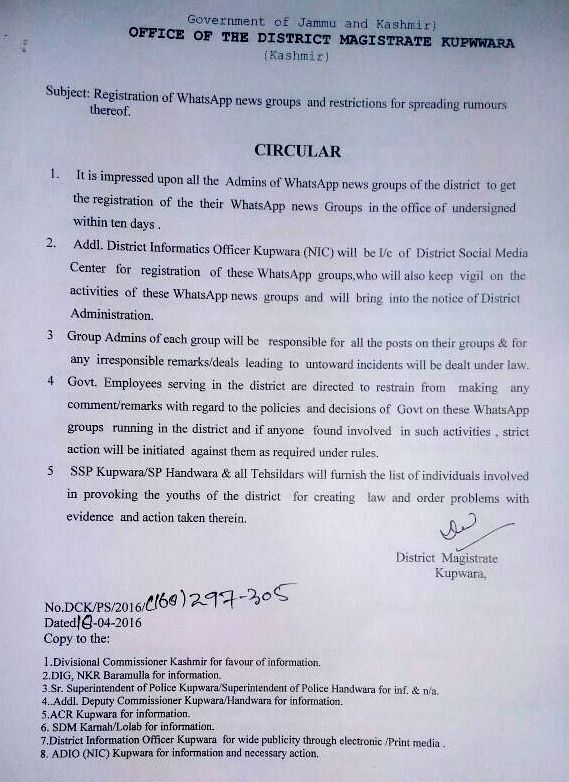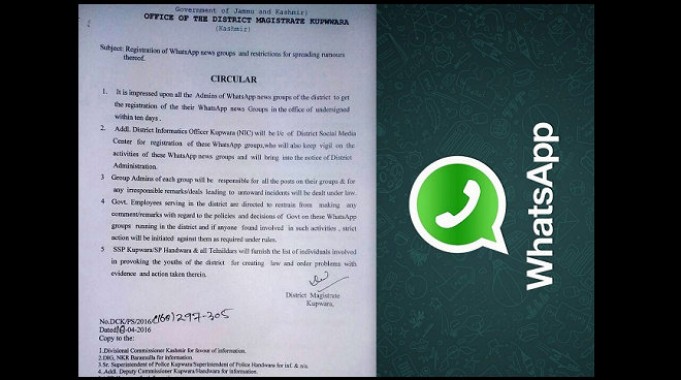Get permission from a DC to post on WhatsApp!
SRINAGAR: Three weeks ago Jammu and Kashmir saw an order passed demanding the registration of WhatsApp groups in the state. What is still not clear is under what law this step was taken, how permissible it is under current law, and whether such an order is sustainable given that it infringes the right to free speech?
The order was first issued on April 18 by the district magistrate of Kupwara immediately after the alleged assault of a girl by a soldier in Handwara town in north Kashmir. The molestation rumour spread on social networking sites such as WhatsApp which in turn led to protests in the town in which five civilians were killed in different firing incidents by the security forces.
The order says that all the group admins of the existing WhatsApp news groups have to register themselves in the district magistrate’s office as soon as possible and adds that this move will help stop rumours spreading.
The government has made clear its intentions to keep an eye on WhatsApp groups and to hold admins responsible for all goings-on. The order said that the police will take action against those who post incendiary messages on WhatsApp. Government employees have been instructed to refrain from questioning or commenting on the diktat.
The situation became even more confused when another arm of the government, the Department of Information and Public Relations, issued a press release that was different from the Kupwara district magistrate’s order although it amounted to curbing freedom of expression.
While the district magistrate’s order required registration, the press release quoted Divisional Commissioner, Dr Asgar Hassan Samoon, as saying that “proper permission from the concerned Deputy Commissioners” is required for “posting news on social media news groups along with sources” and also that “action will be taken against the violators.”
This smacks of pre-censorship and is even more draconian because it applies not just to the mass media but to everyone. Registration, as ordered by the district magistrate, is bad enough but at least it does not depend, as this press release states, on the whim of an individual. What remains of the guarantee of freedom of speech granted by the Constitution if the prior ‘permission’ of a government official is needed? Moreover, apart from being equally arbitrary, how is that two arms of the government can be so inconsistent in their orders?
The Press and Registration of Books Act, 1867, which (since 1965) is applicable to Jammu & Kashmir, requires registration by all newspapers published in India, but does not cover social media. Nor does the Jammu and Kashmir State Press And Publication Act, 1932 cover social media. It is clear that the district magistrate can’t make up requirements when Parliament and the State Legislature have opted not to.

While talking to the Hoot, Deputy Commissioner of Srinagar, Farooq Lone, said that the decision to ask for WhatsApp registration was taken by the Divisional Commissioner in a joint meeting with the top brass of the Jammu and Kashmir Police. He said that the basic aim was to track down the people who use social networking sites for rumour mongering.
“After proper police verification, the registration will be given to the applicant by the concerned deputy commissioner. It has been also mentioned in the order that these news groups on WhatsApp, Facebook or any other social networking have to mention sources, so that action can be initiated against rumour mongers”, said Lone.
Unlike many other laws passed by the Indian Parliament, the Information Technology Act is applicable to Jammu and Kashmir. Post-amendment, Section 79 provides strong protection for intermediaries against liability for actions by others, with limited exceptions.
It says:(1) Notwithstanding anything contained in any law for the time being in force but subject to the provisions of sub-sections (2) and (3), an intermediary shall not be liable for any third party information, data, or communication link made available or hasted by him.
(2) The provisions of sub-section (1) shall apply if—
(a) the function of the intermediary is limited to providing access to a communication system over which information made available by third parties is transmitted or temporarily stored or hasted; or
(b) the intermediary does not—
(i) initiate the transmission,
(ii) select the receiver of the transmission, and
(iii) select or modify the information contained in the transmission;
(c) the intermediary observes due diligence while discharging his duties under this Act and also observes such other guidelines as the Central Government may prescribe in this behalf.
(3) The provisions of sub-section (1) shall not apply if—
(a) the intermediary has conspired or abetted or aided or induced, whether by threats or promise or othorise in the commission of the unlawful act;
(b) upon receiving actual knowledge, or on being notified by the appropriate Government or its agency that any information, data or communication link residing in or connected to a computer resource controlled by the intermediary is being used to commit the unlawful act, the intermediary fails to expeditiously remove or disable access to that material on that resource without vitiating the evidence in any manner.
Hoot readers should note that the expression “third party information” means any information dealt with by an intermediary in his capacity as an intermediary.
The district magistrate of Kupwara, however, ignored this by issuing his order and, in so doing, contravened a law passed by Parliament. His circular states: “Group admins of each group will be responsible for all the posts on their groups and for any irresponsible remarks/deals leading to untoward incidents will be dealt under law.”
This is a gross violation of Section 79, and is beyond the powers of the district magistrate. The Telecom Regulatory Authority of India was not consulted before the order was issued by the authorities even though Over the Top services such as WhatsApp come under its purview.
However nearly three weeks later, on May 4, the government asked the Senior Superintendents of Police and tehsildars to furnish the list of people, including government employees, who are provoking the public, especially youths, to “fan militancy” through their comments and uploads on WhatsApp groups.
In the directive issued by Divisional Commissioner Kashmir seeking the monitoring of Whatsapp groups, the Deputy Commissioners have been asked to take action in cases where the militants are glorified through these groups.
“The delinquents involved in provoking the general public especially youth for creating law and order problems against whom there is evidence shall be dealt with sternly,” noted the recent directive.
Officials said the latest directives have come in response to videos of heavily armed militant commanders being circulated on WhatsApp groups. Inspector General of Police Kashmir, S.J.M. Gilani, said the monitoring of WhatsApp groups had been initiated to ensure that rumours did not create law and order problems.
Requiring prior permission from a government official or having to register with the authorities beforehand in order to be able to post messages on a WhatsApp group cannot be considered a “reasonable restriction” under Article 19(2) of our Constitution. Having such onerous requirements will only discourage even legitimate and lawful speech.
At a time when freedom of speech and privacy are being widely discussed and debated, this is quite a regressive step by the Kashmir state government.
In these days of end-to-end encryption, the government wants a licence of sorts to be required for running a WhatsApp group, a step that will only invite ridicule. Internet rights activists have criticised the move as unconstitutional.
"Monitoring the groups is very hard. And it is absurd to hold the admin responsible for everything on the group. The WhatsApp admin can add or remove people. They can't control the content people post on the group. The government should understand that WhatsApp is not the only medium to communicate. There are many apps which allow making groups. They should use social media for monitoring the activities in a manner that doesn't throttle freedom of speech," said Prasanth Sugathan, counsel with the Software Freedom Law Centre in a tweet.
The authorities appear to have no idea how to control what’s being shared on WhatsApp. The order seems to have been issued hurriedly without having any idea of how these apps work. Here’s what can happen:
1. It’s going to be the WhatsApp group admin’s neck on the line if anyone posts anything that is deemed negative or offensive. And yes, this is not farfetched. We have already have instances where the group admin has been arrested.
2. While the order does not clarify how the conversations will be monitored, the only feasible way to do it is if the district magistrate or a government official is added to existing WhatsApp groups. Besides, if an admin exits a group, WhatsApp randomly assigns admin status to any one of the group members, according to WhatsApp's terms of service. Ergo, your mere presence in a group can implicate you for content posted by others. This shows lack of understanding on how apps work and how the law applies to such situations.
3. What if the WhatsApp group is created in any other state except J&K but all the members are from J&K and discuss state issues. How is the government going to stop it?
4. How will the government discover that a new group has been created on WhatsApp without registration even in their own state?
Not surprisingly, users of social media are far from pleased with this latest move. According to official sources, none of the group admin so far has applied for the registration of a WhatsApp group, proving there are no takers for this illegal order. There are hundreds of groups - especially news groups - which are operating without registration, despite the recent order.
Instead of imposing restrictions, the government should seek to quell rumours by using social networks to spread the truth, and by using social networks to warn potential rioters of the consequences. That will be a useful measure, not this registration nonsense.
Irfan Quraishi is a Kashmir-based broadcast & multimedia journalist and works with Punjab Kesari. He has previously worked for Day & Night News and Kashmir Times. He tweets @ irfanquraishi85.
